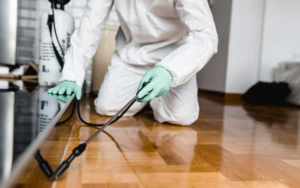Bakersfield Exterminator work to treat pest infestations that threaten the health and safety of a person or building’s occupants. They may use protective equipment like goggles and respirators when working with dangerous chemicals.
An exterminator inspects the infested area before applying treatments. They may then use chemicals, traps, or baits to remove the pests from the home.

An exterminator’s primary job is to control pest infestations. They use chemicals, natural solutions, traps, and cages to eliminate unwanted insects and animals. They also work with property owners to prevent infestations by advising them on landscaping tactics, cleaning strategies, and keeping up with maintenance.
They can provide a full home inspection to identify entryways, exit points, and potential problem areas. They can then create a customized treatment based on the inspection findings. They can also implement recurring therapies to ensure that the pests don’t return. Ultimately, an exterminator is all about prevention because an ounce of protection is worth a pound of cure. They also offer termite inspections for homeowners and real estate agents. These inspections include a visual assessment of your property and a written report.
Commercial
Running a business or commercial space comes with many responsibilities and tasks, one of which is pest control. While it may fall lower on the to-do list than other tasks, keeping your property pest-free is important for the health of your employees and the safety of your customers and visitors.
An exterminator can help you get back to business as usual with professional, discreet commercial pest control services. Your local exterminator will put together a customized plan to address the pests in your building and surrounding area. This will be based on the type of pest, the severity of the infestation, and whether or not you are interested in prevention.
Integrated Pest Management (IPM) is an alternative to extermination that uses methods such as barriers, repellents, and monitoring to reduce the use of pesticide chemicals. It is an effective, sustainable approach to pest control and can be used for buildings of all types and sizes. It is especially useful in sensitive areas like hospitals and schools. It is a great option for businesses looking to minimize their use of chemical treatments.
Industrial
In industrial warehouses and manufacturing plants, pest infestations can lead to failed inspections, production shutdowns and costly lawsuits. Exterminators who specialize in industrial pest control use hands-on strategies to ensure clean, productive workspaces. They work with property owners to develop and implement pest control programs for warehouses, food processing facilities and other industrial complexes.
An experienced pest control expert can remove infestations of any kind. They also work with clients to prevent future problems by advising on landscaping tactics, cleaning strategies and keeping up with maintenance. In addition to eliminating pests, an exterminator can help protect people from the diseases and germs they carry. Mosquitoes, for example, spread the West Nile virus, encephalitis, dengue fever, Zika virus and Chikungunya disease, while fleas and ticks can cause typhus, plague and Lyme disease. Some insects, such as bees and hornets, can even pose a danger to human beings. In these cases, an exterminator will relocate the hive to a safer environment.
Warehouse
Warehouses are home to massive amounts of inventory that will eventually be shipped to consumers around the world. That’s why it’s important that warehouses keep pests away from their products. Pests can spread germs and bacteria that can contaminate food and other perishable products. It is essential to have a comprehensive warehouse pest control programme in place to prevent infestations and avoid contamination.
Pest infestations can interrupt warehouse operations and cause significant disruption to workflow. They can also create a health hazard for employees and create an unpleasant work environment. It’s important to contact a pest control company that is experienced in treating large industrial spaces like warehouses. They will be able to identify the most common warehouse pests and implement preventive measures to keep them away from your property.
The vast open space of a warehouse and constant influx of products make it easy for pests to take up residence. Rodents and insects can chew through any material they encounter, including electrical wires, posing a fire hazard for the facility. They can also destroy products and cause damage to warehouse equipment.
These areas are prime habitats for pests, especially with the abundance of food, water and shelter they provide. It’s important to have these areas inspected regularly to ensure that they are kept clean. It is also important to close any gaps, cracks or holes that may allow pests to enter.
While basic cleaning and sanitation practices can prevent most pests, they won’t protect a warehouse from the most persistent threats. Especially with shipments of new products arriving on a regular basis, it’s essential to have a comprehensive warehouse pest control program in place. This will help to protect the product, warehouse employees and end consumers from dangerous diseases and contaminants.
A professional exterminator will create a custom plan to treat the entire warehouse. This will include services such as rodent and insect control, cockroach elimination and bird deterrents. The plan will be designed to fit in with the unique layout of your warehouse. It will also include inspections of seven key areas to keep an eye on for potential pest problems.